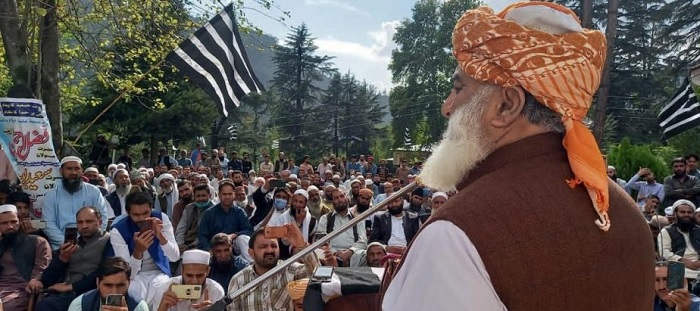No, Fazlur Rehman Cannot Protect Pakistanis’ Democratic Rights

Opposition parties have tapped a right-wing Islamist as the leader of the Pakistan Democratic Movement. That raises serious questions.
Pakistan’s opposition parties have elected the head of the Jamiat Ulema-i-Islam-Rehman (JUI-F), Maulana Fazlur Rahman, as their leader to drive the incoming agitation campaign against the government.
JUI-F is an Islamist party known for its right-wing politics in Pakistan. The appointment of Rehman as the leader of a so-called Pakistan Democratic Movement (PDM) has raised questions about the end goals of the campaign.
With Rehman leading the opposition parties’ mass movement, Pakistanis should forget about safeguarding their democratic rights. Rehman’s politics presents a dire threat to any idea of a progressive, tolerant, and liberal Pakistan. Historically, Rehman has made a career by pursuing anti-democratic politics and he should not be expected to give up on his most common source of legitimacy among his right-wing electorate.
For instance, during the last year’s Azadi (freedom) march against the government, Rehman accused Prime Minister Imran Khan of being a “Jewish agent.” In the same march, Rehman also argued that his protest is “against those who set free” Asia Bibi, a Christian woman acquitted in a blasphemy case in 2019.
Rehman’s party has also targeted other minority sects in Pakistan, including the Ahmadi religious community. In last year’s JUI-F’s march against the government, one of the party leaders said that they are protesting against the Pakistan Tehreek-e-Insaf (PTI)’s government because it “released Christian woman Asia Bibi” and “hired an Ahmadi for the Economic Council,” referring to the appointment of Atif Mian, which was withdrawn after protest from religious parties.
Calling the Azadi march a national movement, Rehman declared that “The religious parties were the first to note the extent and depth of the Western (anti-Pakistan) agenda of the PTI government when blasphemy convicts were sent off (abroad) without due process of law.”
“It was not just blasphemy convicts — a pro-Qadiani agenda followed, which enraged religious sentiment,” he noted further. At one point he even termed the Kartarpur Corridor a “front for allowing Ahmadis easy access to the town of Qadian in India.” Qadian is the birthplace of Mirza Ghulam Ahmad, the founder of the Ahmadi sect.
While JUI-F expresses a commitment to women’s rights, the party has blocked gender equality reforms and barred its female voters from taking part in its protest movements. In 2016, the party rejected the Punjab Protection of Women Against Violence bill that criminalized all forms of violence against women. During 2019’s Azadi march, JUI-F barred its female members from participation by telling them to “stay at home to fast and pray.”
Two days ago, JUI-F’s chief, during his joint press conference with the Pakistan Muslim League-Nawaz (PML-N) vice president, Maryam Nawaz, refused to answer a question related to his support for her candidacy for Pakistan’s top post. “If Maryam Nawaz becomes prime minister, would you support her?” a journalist asked Rehman. In response, he merely laughed and said that it seemed to him that the question was planted.
For many Pakistani observers, the only reason for Rehman’s appointment is that he is opposition’s only hope when it comes to threatening the government and its supporters via street agitation. His appointment to lead the opposition also reflects that major political parties in Pakistan continue to lack street muscle when compared to religious groups.
Over the last few weeks, Rehman has raised the stakes against Pakistan’s national security establishment. During a recent interview, one JUI-F leader openly claimed that the military leadership invited a JUI-F delegation last year and told them to cancel the Azadi march against the PTI’s government. He also added that Army Chief of Staff General Qamar Javed Bajwa told the JUI-F delegation not to interfere in “what we are doing with Sharif.”
In another veiled reference to the Pakistani military, Rehman recently said that “he considers himself more respected than the officers holding high positions and high ranks.” Do not challenge me or my party or “we will do to you what we did to Americans in Afghanistan,” he warned.
Rehman’s appointment as the head of the opposition alliance will put Pakistan’s civil-military leaders in a bind when the march ultimately gets underway. It is relatively easier for the PTI’s government to hold off political parties via arrests and detentions than it is to go after the workers of a religious party.
Further, Rehman’s call to agitation is expected to bring out thousands of protesters, which is necessarily not the case with political parties. The PML-N has started holding regular party meetings and attempting to mobilize its electoral base in Punjab to convey the top hierarchy’s sentiment to its followers. Meanwhile, JUI-F is sitting quietly as it doesn’t necessarily need to build momentum to awaken its followers.
Rehman understands the strength and sentiments of his religious appeal among his followers. But as he leads the opposition, his entire political rhetoric is going to be focused on advocating an anti-democratic vision for Pakistan – the only language his followers abide by and understand.
The incoming march is thus not a movement for social and political change in Pakistan. It is a fight of egos and political interests, which can only happen at the expense of Pakistanis democratic rights.
